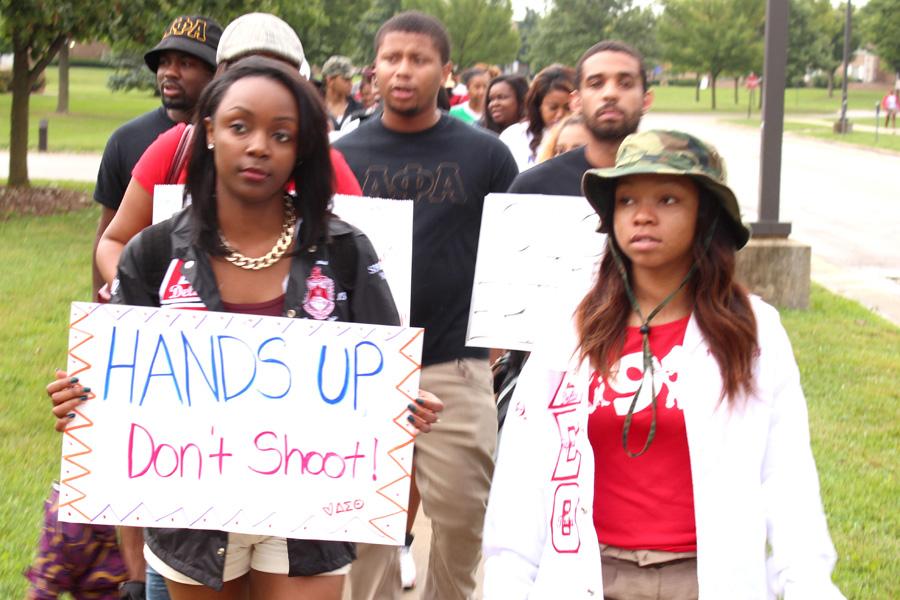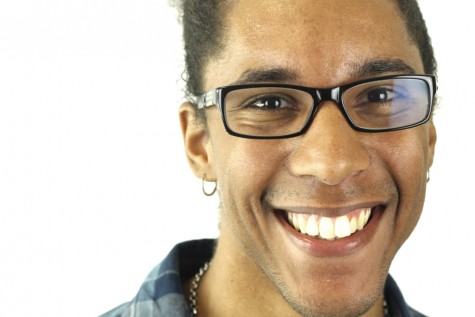Eastern students march in response to Ferguson incident
Kevin Hall| The Daily Eastern News Jalyssa Woodall and Kelsey Hosea ,members of Delta Sigma Theta Sorority inc. lead the march at the “Stand Up & Speak Out” campus-wide march Wednesday. The march started in Greek Court and ended in 7th Street Underground.
August 27, 2014
Wearing clothes of red and black, students from Theta Zeta, a chapter of the Delta Sigma Theta sorority, along with others not affiliated with the group silently marched straight-faced with a purpose Wednesday evening.
The marchers held signs saying “Don’t shoot,” “Black lives matter too” and “Mike Brown RIP.” The students were peacefully protesting the events, which happened in Ferguson, Mo. Aug. 9 and the subsequent days that followed.
The march from Greek Court to the Doudna steps garnered Eastern faculty such as Mark Hudson, director of housing and dining; Mona Davenport, director of minority affairs; Shawn Peoples, associate director of student standards; and Yolonda Williams, Gateway academic advisor.
One student who saw the group’s protest, decided to join as they walked past. Joining in a circle with their hands adjoined, the protesters prayed for the life of Brown before marching into 7th Street Underground.
Ashley Howard, a senior psychology major, began the discussion in the dimly lit room with an overview of events leading up to Brown’s death.
Howard showed a clip of his alleged robbery and then another from one of three autopsy reports.
Brown was shot six times, twice in the head with one bullet going through his eye; immediately following his death, there were protests and anger from residents of Ferguson towards police officers.
“It’s unfortunate to have three autopsies and you still have a lot of unanswered questions,” said Shawn Allen, a senior political science major.
Kelsey Hosea, vice president of Delta Sigma Theta, asked members of the crowd how they felt about the alleged robbery, which resulted in a multitude of responses. Even Browns’ physical profile was mentioned.
“Your size is nothing compared to what a firearm is capable of,” said Marquan Luckey, a senior family consumer sciences major.
Luckey, who seemed to be a little more passionate than some of the others in the crowd, explained that the video was a form of painting African-American males in a negative light in order to justify Brown’s death.
Eventually, a clip was shown of the residents of Ferguson protesting while being attacked with tear gas, which sparked the question of police ethics and looting.
Even the notion of the situation being similar to the Los Angeles Riots of 1992, which was the result of Rodney King’s 1991 beating, was left in the air for audience members to think about.
Brian Hannah, a senior communications major, said the issue in Ferguson was only half about race, while the other half of the story has to deal with class.
Hannah said minorities are the majority of the poverty system, and he thought that looting was a way of rebelling against the system of class.
However, graduate student Mikale Kelley-Ross explained looting was the natural order of rebelling for African-Americans faced by oppression.
Kelley-Ross said when there is a large population of African-Americans in any given place with a small population of Caucasians with all the power, the African-Americans have no way of venting out their frustrations, so looting is inevitable.
“This is nothing new to our history; Mike Brown was just the cherry on top,” she said. “This was going to explode anyway.”
Brandon Goodman, a senior communications major, saw the looting as something that made the situation worse.
Goodman explained looting was not going to help the situation any more, and people needed to come up with a new way of showing unity.
“That’s the anger of our people seeing the same thing over and over again,” Williams said.
Peoples said looting was a result of the anger people felt during that time. She also said she believed there were those who used the situation as an excuse to loot stores.
With Mike Brown being one out of four African-American males killed because of police brutality in August, many in the room felt that some officers reacted too harshly to the situation, such as Dominic Hamilton, a sophomore kinesiology and sports studies major.
“I’m not saying the police aren’t doing their job, but killing one person changed the whole town,” he said. “People have a right to peaceful protest.”
He said because he is an African-American male, there are already stereotypes ascribed to him at birth.
Hamilton, who wears glasses, earrings and has a tattoo, said if he took all of the jewelry and accessories off and only showed his tattoo, he would appear to be a completely different person to the masses than if he just wore a suit and tie.
“People see it as one-dimensional; it’s more than a race thing—it affects everyone,” Hamilton said.
Roberto Hodge can be reached at 581-2812 or rlhodge@eiu.edu.





































































